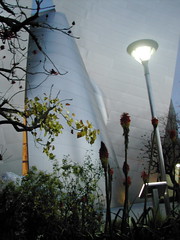Wagnerian Love Story

Let me state first that I'm not one of opera's biggest fans. I don't dislike it, I'm just too impatient to sit through the innumerate variations of "Oh I am lost". When one compares the "high-art" of opera with the more populist musicals, one sometimes has to wonder how opera has survived in our modern pop culture.
But sometimes, when the mood is just right, the setting suitable, it hits you. Opera, whether you understand the wailed out German or French, is very emotive. There is no mistaking a devoted servant lamenting his master's imminent death, as we witnessed Kurwenal efforts to keep Tristan's hopes up that his love, Isolde, would arrive to spend one last hour with him. Ah. And here we run into another problem with opera. The complexity of the plot is not aided by the German words nor a lack of Wagnerian education in schools. I have no doubt that in the very best schools, girls and boys are drilled in the arts and educated on the finer complexities of the misunderstandings and plot twists of Tristan and Isolde, just as Shakespeare's works were drilled into my skull. Unfortunately, by mistake of birth, I did not attend such a school. Instead, I struggled with my vague memory of the last time I saw it on telly, supplanted by a quick read on wikipedia earlier in the day, and a scan of the synopsis helpfully provided by the LA Phil. A cheat-sheet, if you like, for the unwashed and uneducated (same thing). Suffice to say, the plot has everything from near-death experiences, unrequited love (which happens to be requited but unknown or undisclosed), fights to the death or near-death, arranged marriage, unarranged marriage, love potions, poison (same thing), midnight trysts and more. You know, the usual... Throw in Simon Cowell and you get a sanitised version of American Idol.
For all its plot complexities, melodrama, bad acting and over-exaggerated emotion, good opera can grip you if you're in the mood for it. If you're feeling a wee bit menopausal, for example, or just a little down, the death and destruction of Act III* of Tristan and Isolde will co-oscillate and transform your low mood into the very trough of despair. And yet, the evidence of Tristan's love for Isolde, and hers for him, transcends this pit of despondency. And while the lovers will never spend their final hour together, in death, their love will be consummated.
What was my point again? I get side-tracked by the tawdriness of Tristan and Isolde's love affair. Oh yes. The point of this post was to put up my wonky blurry shots of the Walt Disney Concert Hall's garden. There's a complex mini story behind our eventual discovery of the garden. How best to tell it? I'll settle for chronologically for now: Find out friend's birthday is on day of opera. Offer our season tickets to cheer him up (he thinks he's old; needs cheering up a lot). Realise I really want to listen to T+I too. Buy cheap seats so P and I can go get totally depressed as well. Chastised by P for not telling friend; might be awkward if he brings a date. Tell friend. Told by friend his date does not wish to be seen in public with him. Promise and cross heart not to spy. Get to concert hall and realise it will be hard to avoid friend because new seats are close to usual seats. Decide not to loiter in case of awkwardness. Spy garden door. Exit through garden door. Take lots of blurry shots of garden until kick-off. Studiously avoid looking in direction of seats. Until the lights go out and I cannot resist. Damn. Forgot binoculars. Console myself with photographs of WDCH garden and decide to give up being devious:
 |
 |
 |
 |
 |
 |
*This must be a universal truth: in Act III, everybody dies. Always.
Labels: los angeles, walt disney concert hall


0 Comments:
Post a Comment
<< Home